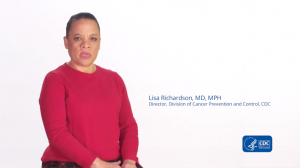Cancer Doesn’t Wait and Neither Should You
Posted on byBy Lisa Richardson, MD, MPH, director, CDC’s Division of Cancer Prevention and Control, and April Donaldson, a cancer survivor who was diagnosed with and treated for breast cancer during the COVID-19 pandemic.

Dr. Richardson: As an oncologist, I know firsthand that cancer doesn’t wait. It doesn’t wait for a pandemic to settle down. It doesn’t wait until you get better health insurance. It doesn’t wait until you get your child through college. Finding cancer early improves your chances of living longer, and being treated for cancer is critical to surviving it. Cancer is a progressive disease. Treatment should begin quickly and continue without interruption, if possible.
I am honored to be joined by April Donaldson. April was diagnosed with and treated for breast cancer during the height of the COVID-19 pandemic. She shares her story and unique perspective.
Dr. Richardson: April, tell us how the pandemic affected your diagnosis and treatment.
April: It really felt like trying to battle two monsters at the same time, and I couldn’t choose to ignore one while I fought the other one. While COVID is deadlier for people with a lower immune system, so is cancer when left untreated. Unfortunately, I knew this for a fact because I lost my mother to cancer when she was only 47 years old. So when I was diagnosed, I knew I had to do everything I could so that I would be there for my family in the future in spite of being afraid of going through treatment during the pandemic.
Once I started treatment, a lot of my fears were relieved because doctors and hospitals were taking extra precautions to keep their patients safe. Not only were they masking, handwashing, and doing temperature checks, but they were going the extra mile making sure waiting and treatment rooms weren’t crowded and offering tele-health appointments when possible.
Dr. Richardson: When my patients ask me about delaying their treatments, I tell them that by doing so, they may not live as long as they could because their cancer will grow larger, which makes it harder to treat and harder to cure. April, what would you tell someone who is worried about going into a health care facility for treatment, or even going for their routine screening test?
April: Like you said earlier, cancer doesn’t wait and neither should you. Delaying treatments is risky. I encourage you to base your health care decisions on facts over fear. I also recommend that you listen to your body, get your recommended cancer screenings (which is how my cancer was found), and get vaccinated for both the flu and COVID-19.
Many People Missed Screenings
About 41% of U.S. adults delayed or avoided medical care during the pandemic. Testing for breast, colorectal, and cervical cancers dropped more than 80% during the pandemic. Because of these missed screenings, many cancers will be found at a later stage, when they are harder to treat. Experts predict that 10,000 more people will die from breast and colorectal cancer due to screening delays.
Please stay on track with your treatments or schedule your cancer screenings today. It may not be fun, but the payoff is worth it!


Post a Comment